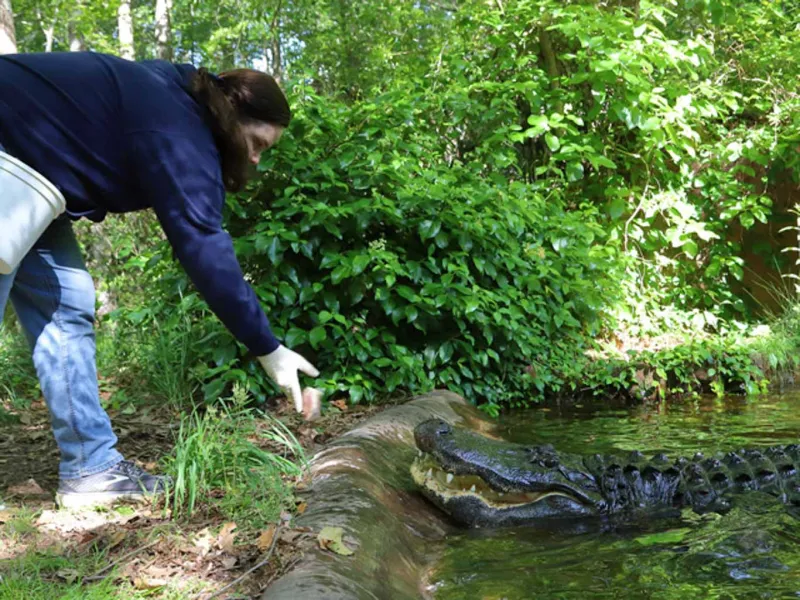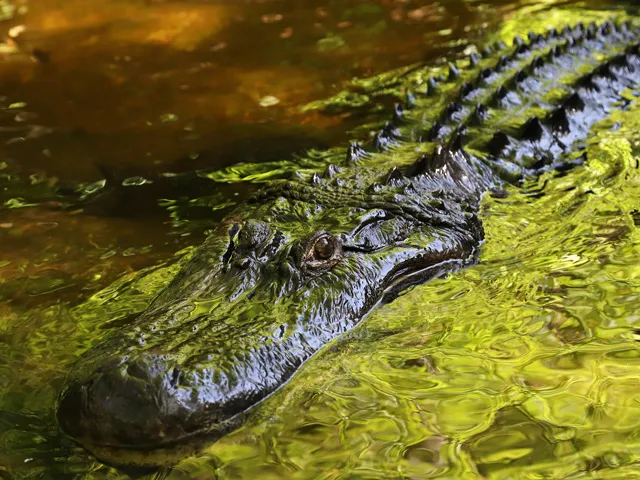Written by Melissa Barr, Cypress Swamp Zookeeper, North Carolina Zoo
I have been a zookeeper at the Cypress Swamp for the past 14 years. It seems like so long ago, but how do you just start working with alligators? At the very beginning, I must admit it was a little scary. I can still remember my first alligator feed asking, “We just walk in there with them? What if they come towards us?” It was Spring, and my coworkers assured that they were not as active this early in the year and would teach me how to safely move around them. The alligators Gatorboy and Liv were out basking next to the large tree in the habitat. We just walked up to them and offered food on tongs. They barely took a few steps but lifted their heads up, swallowing their food whole with their massive mouths.

Zookeeper Melissa Barr feeding Gatorboy
Alligators are one of the only dangerous animals that keepers routinely share space with. We do this for a couple of reasons. Mostly, it is all about safety. But not just for us, it provides a safe way to feed two alligators that are in the same habitat, deter any potential food aggression, and monitor their diet. The other aspects are training and close visual observation. We train them every time we feed them creating two “stations” where they know to go to be fed, usually in the water. But we also train for medical behaviors. We obtain weights, collect blood samples, and can even do radiographs when needed.
Did I mention our alligators only eat twice per week? Would you believe that they only eat six months of the year, from April through October? Alligators are reptiles, and since they are ectothermic (their body temperature is determined by the environment that they are in), they naturally slow down as the temperature becomes colder and stop eating, just like most of our local reptiles. They don’t need to and don’t want to because, without warmth for digestion, food would rot in their stomach and harm them.
There is one particular alligator that stands out above the rest. His name is Gatorboy and he is the largest and most impressive at the Zoo, weighing about 470 pounds and measuring 10 feet long. He is 41 years old, and alligators can live up to 70-80 years. He came to our Zoo in 1994 when he was removed from Anson County, North Carolina. This was well out of natural alligator habitat range; they usually occur in extreme southeastern N.C. An unknown person had moved him to this location and people were feeding him in a pond near the college. This is when alligators are really dangerous -- when they associate people with food. Never feed a wild alligator or any wild animal as a general rule. Fortunately, he was able to come to our Zoo. If there was not a suitable place to relocate him, sadly, he would have been euthanized.
Back in 2011, Gatorboy had some respiratory issues. He even traveled in a van to the veterinary school at N.C .State University for further testing. With care from our wonderful vet and keeper staff he fully recovered and has been doing well. One important aspect to monitor his health is obtaining routine blood work. I am his primary trainer and this is something we train while he is out on land. As part of the training, he follows me to the back of the habitat and stays between a tree and the fence. He usually gets tired after walking around it once or twice. Vet staff is then able to draw blood from his tail. This work requires practice and desensitizing him to touch and injections.

Gatorboy
Gatorboy is healthy and spends his time with his mate Liv, who often builds a nest and lays every year. He will adamantly defend her nest, hissing and puffing up at keepers when they go in to check on it. He is normally calm and docile and use to people, but keepers always remember how dangerous he can be, and learn to work safely in the same space. He has the most impressive mating call or territorial call when he bellows. It is a loud roar, but only males can also create what’s called the, “water dance” when they bellow. It never gets old, I almost run to watch it every time but also to share with people what it is he is doing. Check out a video below!

